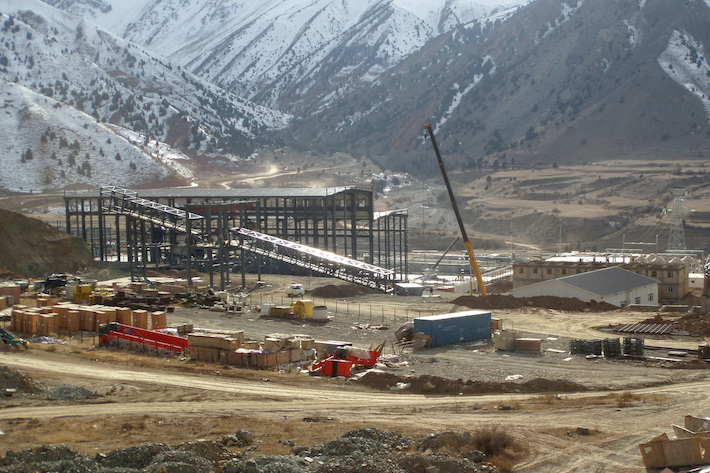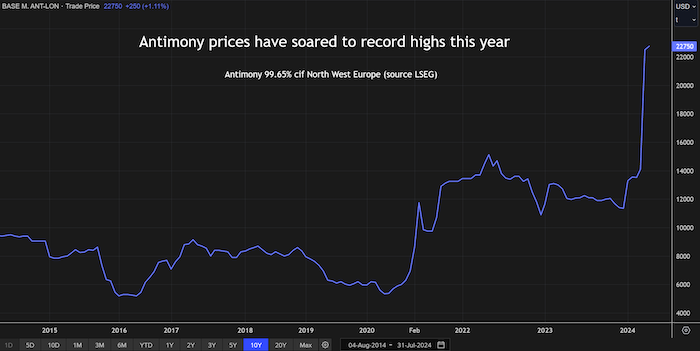China this week announced trade restrictions on key minerals used in technology products such as computer chips, which has begun to disrupt Western supply lines.
Beijing announced Ban on exports of gallium, germanium and antimony respond tuesday Third round of chip restrictions The Biden administration implemented it the day before, but began tightening exports of these products months ago.
One of the first victims of antimony export restrictions was HenkelThe German chemicals and consumer goods heavyweight warned customers last month that it had announced force majeure The company suspended deliveries of four adhesives and lubricants widely used by automakers, according to a Nov. 8 letter to customers reviewed by Reuters.
See also: China strikes back at U.S. ban, halts exports of key chip materials
Henkel uses the silver metal to make its Bonderite and Teroson brand products, which are a core part of the company's adhesive technologies unit, which had revenue of 10.79 billion euros ($11.4 billion) last year.
“Our supplier has informed us that the import of these raw materials has been delayed pending acceptance of the license application by the Chinese government,” the letter, signed by two senior executives, said.
“Henkel therefore hereby declares force majeure in connection with the delivery of these products,” the German company also said, adding that it was unable to predict the duration of the situation.
Henkel's never-before-reported letter and conversations with more than two dozen traders, miners, processors, end-users and industry experts in North America, Europe and China highlight the severe damage caused by Beijing's trade restrictions and Highlights how Western companies are working to replace China's supply chains.
When contacted by Reuters about the letter, Henkel said the company was working to support customers and find alternative supplies: “We are closely monitoring the global antimony supply situation and aim to restore solutions to meet customer orders.”
Antimony prices rise more than 200%
Prices for antimony, which while inherently scarce but crucial for military equipment such as ammunition, infrared missiles, nuclear weapons and night-vision goggles, have risen nearly 230% this year to about $39,000 a ton, according to Rotterdam's busy spot market. Market Intelligence Provider Argus.
China is the world's largest producer of antimony and dominates the production of many strategic materials.
last year, Beijing also restricts exports of gallium and germanium – used in semiconductors, solar panels and weapons – and certain types of graphite – a key ingredient in electric vehicle batteries.
In response to recent U.S. crackdowns on China's chip industry, Beijing has stepped up pressure and banned exports of gallium, germanium and antimony to the U.S. outright. This is a problem for Henkel because it makes Bonderite in Michigan.

Urgent need for new sources
Beijing's restrictions have made it more urgent for Western companies to reduce their reliance on Chinese minerals.
miner permanent resourcesFor example, an antimony mine is being developed in Idaho with U.S. government funding. But the development of new mines can take years, leaving companies like Henkel to look for alternatives, which are often more costly.
“Please note that we are in close contact with our suppliers and using all commercially reasonable means to leverage our global supply chain to resolve this issue and support our customers,” Henkel said in the letter.
Meanwhile, some Western miners and processors have begun expanding production capacity.
American antimony USAC Corp., North America's only metal processor, plans to increase output at its Montana smelter, which has reached 50% capacity after China announced restrictions on antimony exports in August.
“Our decision to increase production was driven primarily by the fact that global antimony prices in Rotterdam have more than tripled,” said Gary Evans, the company's chairman.
China's restrictions “significantly increased demand for our finished products,” he added.
The company said mining at the Montana site ceased in 1983 when it was cheaper to source antimony from mines outside the United States and environmental restrictions now prohibit mining there.
Evans said USAC, which is not dependent on China, is in talks to receive materials from four other countries and a domestic supplier as early as December, but declined to name the specific supplier for competitive reasons.
Ottawa Order northern graphiteShares of the company that claims to be North America's only producer of natural flake graphite are trading at China graphite restrictions Chief executive Hugues Jacquemin told Reuters the plan was announced in October 2023.
“When export controls came into effect in December, demand surged. We started to increase production capacity,” said Jacquemin, whose company is developing projects in Namibia and Ontario to expand its mine in Lac des Iles, Quebec.
China accounts for more than 70% of the supply of naturally mined graphite and its synthetic varieties.
U.S. miners extract germanium from zinc ore
Mark Jensen, CEO Ray Element TechnologyU.S. Resources, which specializes in rare earth recycling and refining, said China's latest export ban meant it had received at least 10 calls this week from U.S. miners offering zinc ore, which may be a source of germanium during processing. .
He said the goods had previously been shipped to China for processing due to lower labor costs and different environmental standards.
“We have been contacting U.S. suppliers of these ingredients to sell these by-products to us instead of shipping them to China because we are now a substitute for China,” Jensen said.
canadian miners Teck ResourcesThe company produces germanium as a by-product at its Red Dog zinc mine in Alaska and is North America's only supplier of the metal.
Mineral product prices rise
China's export crunch has triggered a surge in prices for many strategic minerals.
According to the Toronto company, gallium sold outside China in the first half of 2024 was 30% to 40% more expensive than the same period last year New functional materialsAugust said the company produces gallium by recycling manufacturing scrap.
In China, the restrictions have forced some weaker companies out of the market, traders and analysts said.
Two Chinese germanium traders said they had given up exporting because they could not obtain licenses, either because overseas customers were unwilling to provide specific details of end users or because they were from the United States.
Chinese customs data shows that no Chinese germanium or gallium had been shipped to the United States through October this year, even before Beijing imposed its latest restrictions on the United States. During the same period in 2023, the United States ranked fourth and fifth largest mineral export markets.
For end users, China’s restrictions underscore the importance of supply diversification.
“When you reduce risk, you need to use different levers to reduce risk,” said Maxime Picat, chief procurement officer at automaker Stellantis. “If you're a single-solution company, know your If the battery suppliers are all Chinese or all Korean, then you are at risk.”
- Reuters Additional editing by Jim Pollard
See also:
China's blockade of critical minerals could lead to global chip shortage
China to restrict exports of antimony metal, ores and oxides – South China Morning Post
U.S. tech companies face 'death spiral' from new Chinese restrictions: Lawmakers
China issues gallium, germanium export license
China metal restrictions and rare earth risks fuel search for safe sources
China's gallium solves EV maker's dilemma
China limits exports of key EV metal as tech war with U.S. deepens
The United States expands its ban on top-level artificial intelligence chips, covering multiple countries
China bans export of two chip-making metals in August
China's gallium solves EV maker's dilemma
China’s envoy warns US: More chip bans, we will fight back





